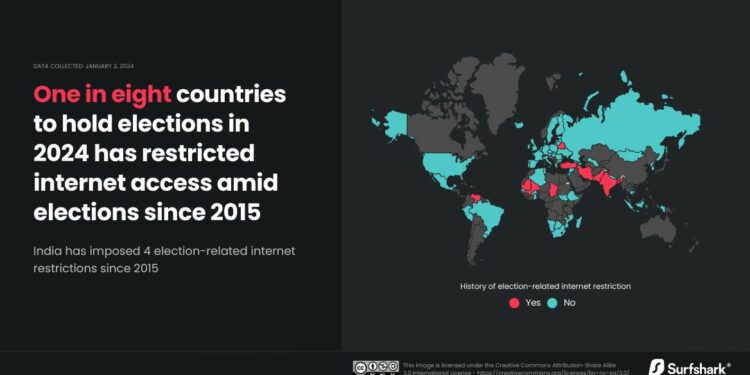2024 Elections Alert: Internet access at risk in one in eight countries
Internet freedom is heavily affected in specific parts of the world. Sub-Saharan Africa leads with 29 reported cases of election-related internet censorship since 2015, closely followed by Southern Asia with 28 incidents.
- Advertisement -
In 2024, elections are set to take place in 90 countries. Elections have a history of triggering increased internet restrictions in some countries. Such restrictions compromise the integrity and fairness of elections by enabling governments to exert greater control over the public narrative.
Surfshark’s Research Hub has published an analysis detailing the countries that have been imposing internet restrictions during elections since 2015, and it forecasts those at risk of doing so in 2024.
- Advertisement -
“Election season often brings a wave of internet shutdowns around the world. As we gear up for an election-packed 2024, our Research Hub has examined internet freedom in 196 countries. We’ve discovered that countries with a history of internet blackouts during elections score an average of just 32 out of 100 on the global freedom scale. As a reminder, this scale measures personal, civil, and economic freedoms. 32 is significantly below the worldwide average of 58. This suggests a strong connection between digital censorship and wider violations of freedom,” says Agneska Sablovskaja, Lead Researcher at Surfshark.
- Advertisement -
Among the 90 countries gearing up for elections in 2024, 12 have a history of imposing restrictions on internet services during election times. Since 2015, a significant 75% of these interventions involved severing network connectivity. This tactic does more than just mute online conversations — it disrupts the flow of information essential for transparent electoral processes. The other measures have primarily concerned social media blackouts, which hinder the citizens’ ability to communicate, organize, and voice their objections.
Sub-Saharan Africa and Southern Asia in the spotlight
Internet freedom is heavily affected in specific parts of the world. Sub-Saharan Africa leads with 29 reported cases of election-related internet censorship since 2015, closely followed by Southern Asia with 28 incidents. The impending 2024 elections loom large over countries in these areas — Mali, Malawi, Chad, and Mauritania in Sub-Saharan Africa and India, Iran, Pakistan, and Bangladesh in Southern Asia.
- Advertisement -
These trends suggest a strategic use of digital suppression tactics in these regions, which, coupled with their histories, indicate a heightened risk for internet blackouts as their elections draw near.
The spring season poses significant challenges for India and Iran, which are preparing for parliamentary elections in the shadow of their records of internet clampdowns. India has had four such instances and Iran three, since 2015. All of this creates a worrying pattern that these countries might resort to similar tactics to stifle digital communication in upcoming elections.
Belarus is also stepping into the election arena with its upcoming parliamentary elections. The country’s latest presidential election was significantly affected by extensive internet disruptions and the strategic blocking of social media channels, particularly Twitter — a vital platform for political participation and societal dialogue.
About Surfshark
Surfshark is a cybersecurity company focused on developing humanized privacy and security solutions. The Surfshark One suite includes one of the very few VPNs audited by independent security experts, an officially certified antivirus, a private search tool, and a data leak alert system. In 2021, Surfshark was recognized as the Most Innovative Security Service at the Cybersecurity Excellence Awards and a Must-have App in TechRadar’s WFH Awards. Visit our research hub at: surfshark.com/research.
- Advertisement -


